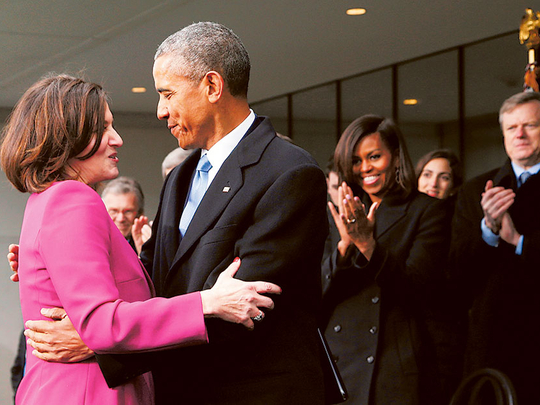
Boston: President Barack Obama on Monday condemned the demise of bipartisan compromise in US politics that he said had prompted voters to turn away in bitterness and “disgust”, using the dedication of the Edward M. Kennedy Institute to call for a new era of consensus-building.
“We live in a time of such great cynicism about all our institutions, and we are cynical about government and about Washington most of all,” Obama told about 1,800 people in a speech outside the institute, which was constructed to help repair the reputation of the US Senate, where Kennedy represented Massachusetts for 47 years.
“We can fight on almost everything, but we can come together on some things, and those some things can mean everything to a whole lot of people,” Obama said.
In a 26-minute speech by turns hopeful and mournful that evoked Kennedy’s thundering Senate oratories and his sometimes impish antics, Obama paid tribute to the man often called “the lion of the Senate” while acknowledging how the institution he revered had changed.
“It’s a more diverse, more accurate reflection of America than it used to be, and that is a grand thing, a great achievement, but Ted grieved the loss of camaraderie and collegiality, the face-to-face interaction,” Obama said. “He regretted the arguments now made to cameras instead of colleagues, directed at a narrow base instead of the body politic as a whole, the outsized influence of money and special interests, and how it all leads more Americans to turn away in disgust and simply choose not to exercise their right to vote.”
The president, who served one term in the Senate — much of it consumed with speculation over whether he would seek the presidency — indirectly acknowledged his own role and that of his generation in the transformation of Congress.
He noted that Kennedy had waited more than a year before delivering his first speech in the Senate’s august well, an exact replica of which is the institute’s most striking feature.
Warm and boisterous
“That’s no longer the custom,” Obama said, to laughter. (He made his debut on the Senate floor just two days after being sworn in, in January 2005.)
Nor does Obama’s style or temperament bear much resemblance to that of Kennedy. Where the president is aloof, disciplined and disdainful of the social aspects of serving in Washington, the senator was warm and often boisterous, and he excelled at the art of feuding by day but socialising by night with political adversaries.
Still, Obama and Kennedy forged a bond that helped propel the president to the White House, one that he acknowledged on Monday.
“He was my friend; I owe him a lot,” Obama said.
Obama routinely went to Kennedy for Senate advice, including guidance before entering the presidential race in 2008. Kennedy’s endorsement of Obama during that year’s Democratic presidential primaries gave Obama the high-profile stamp of approval of a party symbol at an important moment.
The capstone to their alliance came in 2010, when Obama signed the Affordable Care Act, legislation that Kennedy had championed and that his wife, Victoria Reggie Kennedy, noted in introducing the president on Monday was “what Teddy called the cause of his life”.
But Obama said that while colleagues knew Kennedy as “somebody who was willing to take half a loaf and endure the anger of his own supporters to get something done,” his brand of political courage was a disappearing trait.
‘Tutor and guide’
“Fear so permeates our politics, instead of hope,” the president said. “We fight to get these positions, and then don’t want to do anything with them.”
Obama said he hoped that the institute would inspire people to emulate Kennedy, and as he briefly toured the Senate replica after his remarks, he told a group of visiting students that he hoped they would learn about democracy there.
The dedication drew a host of prominent figures from both parties, including the former Senate majority leaders Trent Lott, Republican-Missori, and Tom Daschle, Democrat-South Dakota, a tribute to Kennedy’s deep relationships in Congress.
“He was an anchor to many of us in our personal lives, but he was also the anchor in an institution that we revered,” said Vice-President Joe Biden, who served for 36 years with Kennedy. He said the senator “treated me like a little brother.”
Biden described how Kennedy acted as his “tutor and my guide” when he arrived in the Senate, squiring him around the gym introducing him to senators who were undressed. “God, was I embarrassed,” Biden recalled. The vice president went on to praise Kennedy for instilling in him the importance of maintaining trust and a personal rapport even with arch-nemeses such as Southern senators opposed to the Civil Rights Act.
“All politics is personal, and no one, no one in my life understood that better than Ted Kennedy,” Biden said. “This country hungers for a resurgence of a baseline belief in a system of self-governance admired for its wisdom in the face of passionate differences, and for the ability to compromise seemingly unbridgeable divides with some dignity.”












